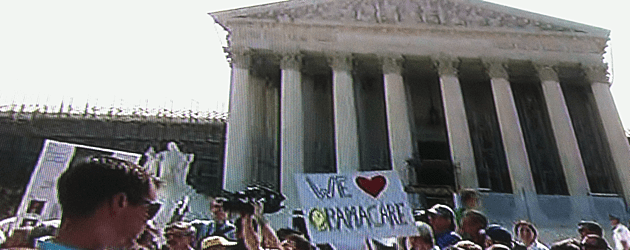 In a dramatic move with significant political and economic implications, a majority of the U.S. Supreme Court on Thursday (June 28) voted to uphold President Obama’s landmark health care reform law. The vote, at least in regard to the key conflict, was 5 to 4, with Chief Justice John Roberts writing the opinion and joining the four justices on the liberal wing.
In a dramatic move with significant political and economic implications, a majority of the U.S. Supreme Court on Thursday (June 28) voted to uphold President Obama’s landmark health care reform law. The vote, at least in regard to the key conflict, was 5 to 4, with Chief Justice John Roberts writing the opinion and joining the four justices on the liberal wing.
The decision is a big relief to people with costly illnesses, including people with HIV or breast cancer. It is an enormous political victory for the Obama administration, because health care reform was Obama’s signature achievement thus far in his first term. And it creates an awkward issue for Republican presidential nominee Mitt Romney to negotiate. Romney worked for a similar plan for Massachusetts, when he was governor, but has since joined the majority of Republicans in arguing vigorously against requiring citizens to buy coverage or pay a “tax” for not doing so.
The Affordable Care Act (ACA) “individual mandate” requires every citizen, by 2014, to either buy health coverage or pay a penalty that helps mitigate the burden on the health care system when they seek medical care without insurance.
All three of the nation’s major LGBT legal groups had signed onto a brief in support of the ACA, noting that 30 percent of people with HIV are not able to obtain health insurance.
Among other things, the ACA prohibits insurance companies from limiting or refusing coverage for a person with HIV, breast cancer, or any other disease. It also prohibits insurance companies from dropping a person’s coverage after the person became ill.
Justice Anthony Kennedy, writing for the dissent, said he believes the entire law is unconstitutional. He was joined by the court’s conservative wing, including Justices Antonin Scalia, Clarence Thomas, and Sam Alito.
Lambda Legal, Gay & Lesbian Advocates & Defenders, the National Center for Lesbian Rights, the National Center for Transgender Equality and others submitted a joint brief in support of the ACA. They argued the law ensures health coverage for people with HIV and, in doing so, stems the spread of the virus to others. That, they said, also helps contain the enormous burden that HIV infection puts on the health care system.
The 30-page brief was one of more than 130 briefs filed in HHS v. Florida and several other lawsuits seeking to strike down the ACA, signed into law two years ago by President Obama.
The gay groups’ brief, like most media reports, focused on the ACA individual mandate that everyone purchase health coverage. Under ACA, with some exceptions (including religious-based objections and poverty), everyone would have to obtain health coverage starting in 2014. Those who failed to do so would have to pay one percent of their income annually as a penalty. Over the years, the penalty rises, but there are limits to how high it can go.
With the individual mandates, argued the gay groups’ brief, “thousands of lives—and billions of dollars—could be saved each year, and the HIV/AIDS epidemic could be dramatically curbed.”
Carl Schmid, Deputy Executive Director of The AIDS Institute, said his group was “extremely pleased” with the upholding of the ACA.
The court upheld other points of contention in the law, including whether states can be required to cover the expanded number of people qualifying for Medicaid under the ACA. Some states opposed that expansion, saying it unfairly increases the state’s obligation to share the Medicaid costs. The majority opinion said the federal government could not withdraw existing Medicaid funding from states that were unable to fund the expanded pool.
In other Supreme Court news this week, the high court voted 5 to 3 (with Justice Elena Kagan recusing herself) to strike down three provisions and at least temporarily sustain one provision of Arizona’s controversial immigration law. Lambda Legal said the one provision retained —allowing law enforcement officers to stop any person they suspect is in the United States without the federal government’s permission— is especially harmful to LGBT people.
“LGBT immigrants and LGBT people of color remain particularly vulnerable because this provision… requires police to stop and question people based on their appearance,” said Lambda, in a statement released about the decision. “The LGBT community knows all too well how easily people who are perceived to ‘look different’ or ‘act different’ can be singled out for harassment and persecution.”
Lambda said it would join other groups in staging a constitutional challenge to the provision. The Supreme Court did not declare the provision to be constitutional but said it could be enforced until such time as a court does rule it to be unconstitutional.
The majority struck down three other controversial provisions of the Arizona law as overstepping state authority and encroaching on the purview of federal authority.
Justice Anthony Kennedy wrote the majority opinion, which was joined by Chief Justice John Roberts and Justices Ruth Bader Ginsburg, Stephen Breyer, and Sonia Sotomayor.
© 2012 Keen News Service. All rights reserved.







